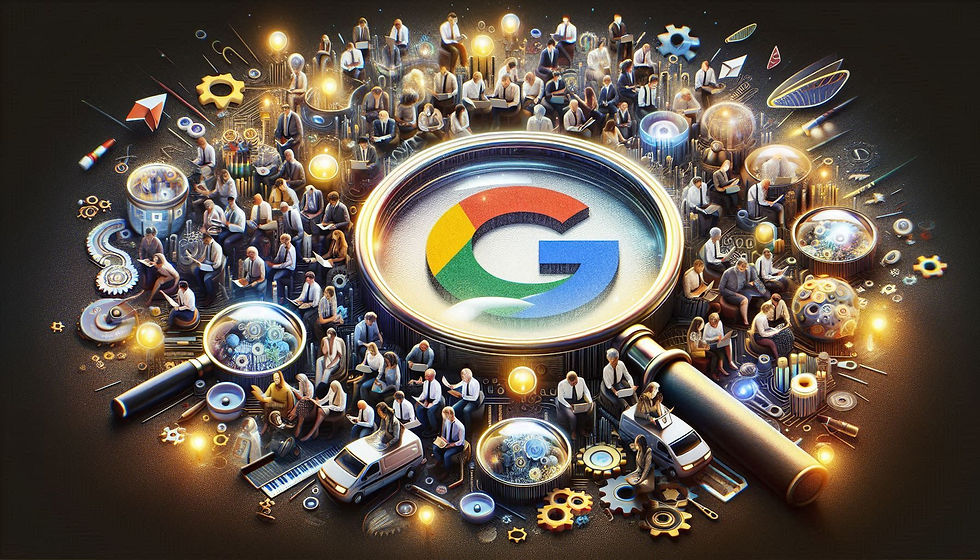Google's Monopoly Era Ends: AI-Driven Competitors Reshape the Search Landscape
- Elias Zeekeh, MBA, CPA, CMA

- Oct 9, 2024
- 4 min read

In a rapidly evolving digital landscape, Alphabet's Google, long considered the undisputed king of search, is facing unprecedented challenges to its dominance. As artificial intelligence (AI) reshapes the tech industry, Google's once-unassailable position is under siege from innovative competitors leveraging AI-driven models. This shift raises questions about the relevance and timing of current antitrust actions against the tech giant.
The Rise of AI-Powered Challengers
Recent years have witnessed the emergence of formidable AI-driven search alternatives that are fundamentally changing how users interact with information online. Companies like OpenAI, with its ChatGPT, and Anthropic's Claude are at the forefront of this revolution, offering conversational AI interfaces that provide direct answers to queries rather than lists of links[5]. These AI models are not just complementing traditional search; they're redefining it.
Perplexity, an AI-driven search startup backed by Jeff Bezos, is gaining traction by delivering concise, conversational responses to user queries, effectively simplifying the search process[5]. This approach stands in stark contrast to Google's traditional link-based model and represents a paradigm shift in user expectations.
Microsoft, leveraging its partnership with OpenAI, has integrated ChatGPT capabilities into its Bing search engine, significantly enhancing its competitiveness[6]. This collaboration has breathed new life into Bing, positioning it as a serious contender in the search market for the first time in years.
Google's Response and Market Dynamics
Recognizing the threat posed by these AI-powered alternatives, Google has not remained idle. The company has rolled out its own AI-driven offering, Gemini Search, which is now integrated into Google Search results[5]. This move demonstrates Google's agility in adapting to new market realities and its commitment to maintaining its competitive edge.
However, the landscape is shifting rapidly. While Google still dominates in terms of traditional search queries, with ChatGPT recording 82 million queries in July compared to Google's 2.7 billion, the growth rate and user engagement of AI-powered alternatives are noteworthy[6]. These platforms are not just competing for search queries; they're redefining the very nature of information retrieval and interaction.
The Antitrust Dilemma
In light of these developments, the recent antitrust ruling against Google, which found the company in violation of antitrust laws due to its monopolistic practices in search, appears to be addressing yesterday's problems[3]. The digital marketplace has evolved significantly since the initiation of these legal proceedings, and the competitive landscape today is markedly different from what it was even a few years ago.
The court's labeling of Google as a monopolist fails to fully account for the rapid emergence of AI-driven competitors that are fundamentally altering the search market[10]. While Google's practices in securing default status on devices through exclusive contracts have indeed been anticompetitive, the remedy of potentially breaking up the company or forcing it to divest certain business units may be an outdated solution to a rapidly changing problem.
The Future of Search and Competition
As AI technology continues to advance, the future of search is likely to be characterized by a diverse ecosystem of specialized AI models catering to different user needs and preferences. This shift is already evident in the rising popularity of vertical search engines and AI assistants tailored to specific industries or use cases.
Google's vast data resources and technological expertise position it well to compete in this new landscape, but it no longer enjoys the unchallenged dominance it once did. The company's ability to innovate and adapt will be crucial in maintaining its market position against agile, AI-focused competitors.
Implications for Businesses and Advertisers
For businesses and advertisers, this evolving landscape presents both challenges and opportunities. The fragmentation of the search market may complicate advertising strategies that have long relied on Google's dominance. However, it also opens up new avenues for reaching consumers through innovative AI-powered platforms.
Advertisers will need to diversify their strategies, potentially allocating resources across multiple AI-driven search platforms to maintain reach and effectiveness. This shift may lead to more targeted and conversational advertising approaches that align with the interactive nature of AI search interfaces.
Conclusion
The notion of Google as an unassailable monopoly in search is becoming increasingly outdated. The rapid advancement of AI technology and the emergence of innovative competitors have fundamentally altered the competitive landscape. While Google remains a dominant player, it now faces genuine competition from AI-driven alternatives that are reshaping user expectations and behaviors.
In this context, the current antitrust actions against Google, while addressing important historical issues, risk focusing on outdated paradigms. The real challenge for regulators and policymakers will be to foster an environment that encourages innovation and fair competition in the AI-driven future of search, rather than attempting to dismantle a monopoly that is already being eroded by technological progress.
As the search landscape continues to evolve, businesses, advertisers, and users alike must adapt to a more diverse and dynamic ecosystem. The era of a single dominant search engine is giving way to a future where multiple AI-powered platforms compete to provide the most effective and personalized information retrieval experience. In this new reality, Google's challenge will not be maintaining a monopoly, but rather staying at the forefront of innovation in an increasingly competitive and AI-driven market.
Citations:
[1] https://www.searchenginejournal.com/google-search-revenue-grows-14-in-q2-2024/522922/
[2] https://abc.xyz/assets/19/e4/3dc1d4d6439c81206370167db1bd/2024q2-alphabet-earnings-release.pdf
[3] https://www.cnn.com/2024/08/05/business/google-loses-antitrust-lawsuit-doj/index.html
[4] https://www.npr.org/2024/10/09/nx-s1-5146006/justice-department-sanctions-google-search-engine-lawsuit
[5] https://www.webpronews.com/google-finally-faces-real-competition-perplexity-chatgpt-grok-search/
[6] https://www.benzinga.com/analyst-ratings/analyst-color/24/08/40230236/wholl-conquer-ai-search-bullish-alphabet-analyst-praises-google-gemini-while-it-fac
[7] https://risingwave.com/blog/leading-openai-competitors-you-need-to-know-in-2024/
[8] https://economictimes.indiatimes.com/tech/technology/us-to-propose-how-google-should-boost-online-search-competition/articleshow/114048786.cms
[9] https://fortune.com/2024/10/09/google-antitrust-doj-remedies-ai-search/





.png)


Comments